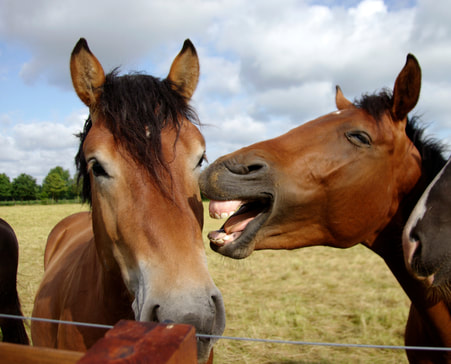 What if it was as easy for horses to sell their old humans as it sadly often is for humans to sell their old, ‘been there done that’ horses? Indulge me please in my anthropomorphic moment. I can just hear it now, a couple of good old geldings standing around the water trough talking about the pros and cons of trading in their current humans for newer models. The first gelding starts the conversation like this: “My rider is just a little ornery, nothin that’ll get ya hurt but boy oh boy would I like a human with a little better attitude.” “Well,” questions his friend, “Have you considered the fact that he might be hurtin? Maybe he needs a little chiropractic work?” “No way,” replies the first disgruntled horse, “If you knew what I spent on that dud…nope cheaper just to replace him. He can be somebody else’s problem.” “I hear that,” replies the second horse, “Gonna have ta let mine go too. We had a good run but she’s just too old to do what I need her to do. I’m still wanting to chase cattle and cans, and she’s content to dawdle down the trail. Yup, I gonna halve ta find me a kid and let the old girl go.” “I hate to do it,” says the first horse, “But it’s been over two years since he hurt himself and he’s still complaining about it. Takes him forever to get up and off that mounting block. What I used to hear when we went for a ride was, ‘Good boy, Good boy’. Now all I hear is ‘Oh boy, Oh boy’. So I know what you mean about needing a kid. I tell you I like the old adage, ‘When the hair is grey send them on their way’.” “It’s so hard to let them go,” comments a little mare, joining the conversation. “But I’m finally gonna trade my rider in too. I had high hopes of being in the show ring but another season has come and gone and my human just doesn’t have what it takes. I don’t know what else I can do. It feels like she’s been in training forever. I’ve finally gotten to the place where every time she flops forward I just stop fast and send her flying over my shoulder. You’d think she’d get it, but so far no. I don’t know how many times she’s going to have to hit the ground before she learns to sit a trot in a downward transition. And she’s not getting any younger, so if I’m ever going to make it in the show ring I need a better rider. Seriously, maybe she’s just too old to learn?” “I do worry sometimes that the next horse might not treat my human well I want to make sure that she is cared for and I don’t want to see her get hurt. So when I sell my human it absolutely has to be to an approved home. Even though my human isn’t right for me, she has always been there for me and she’s always tried her best to do what I asked.” “What do you call an approved home?” asks the geldings, curious. “That’s easy,” replies the little mare, “an approved home is one where they have their own transportation to pick the human up and they are able to pay for her with cash.” ....Just sayin, …What if?...
0 Comments
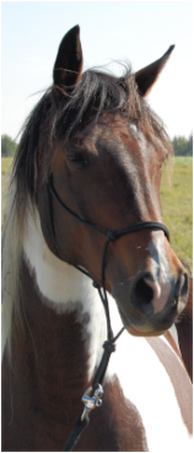 "My belief in life is that we can all get along together if we try to understand one another... You'll meet a lot of people and have a lot of acquaintances, but as far as having friends—they are very rare and very precious. But every horse you ride can be your friend because you ask this of them. This is real important to me. You can ask the horse to do your thing, but you ask him; you offer it to him in a good way. You fix it up and let him find it. You do not make anything happen, no more than you can make a friendship begin." -Ray Hunt The horse human connection began as a partnership forged out of necessity but continued out of mutual respect, and then for most of us evolved into a friendship. We are continually discovering new and fascinating facts about out equine counterparts. And the more we discover, the more we discover that we are not so different. The Native Americans believe that the horse is the animal most like man because he fears the unknown. Both horses and humans are susceptible to panic attacks and to claustrophobia. And let’s face it not one of us hasn’t been spooked by something. Horses like us remember kindness and horses like us sadly remember unkindness too. If a horse is treated kindly, it will remember that person as a friend for as long as it lives. Instantly resuming friendship when given the opportunity regardless of the time spent apart. Horses are even known to mourn the loss of a companion, be it human, horse or another creature. Like us they also remember places very well and most horses will become nervous when taken to a place where an upsetting memory has occurred. We are just now beginning to understand how good our horses’ memories are. A 2010 study has found that a horse’s memory is at least as good as an elephants. They also found that horses understand our words far better than we had ever previously anticipated. And like us they can get bored and boredom in a horse like boredom in a child can often get them into trouble. Horses and children also do well with routine and predictability. They also both like sweets and are both susceptible to sunburn. Music is another thing that horses and humans have in common just as music is good for the soul of man; music has been shown to calm down agitated horses. Findings show that most horses like classical music best. (Apparently so do most people) And by classical I’m pretty sure they mean country. It’s not until we start to look at brain/heart ratio that we begin to see real differences between us and them. An adult horses’ brain only weighs about half that of a human. None of us are surprised by the fact that of the two species we are the more intelligent. So it only makes sense that we design the saddles the bits and the barns. We buy the horse and choose the discipline. But it doesn’t make sense when we attempt to do these things without taking our specific horse and our specific situation into consideration. Because although horses have relatively small brains, they have big, big hearts in comparison, and they will try to the best of their understanding to do all that we ask them to do. So we must plan wisely and ask kindly because when it comes down to the real difference between us and them -We are accountable for them but they in return are obligated to trust us with their lives. Jean 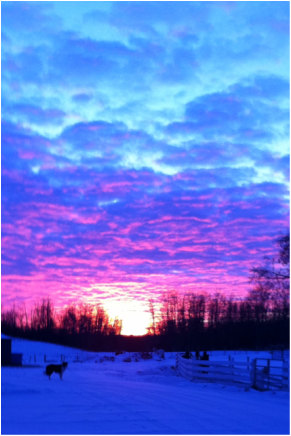 2015: A brand New Year with possibilities as fresh as a newly worked sand arena stretch before us. As we move further into January we officially leave the old year and all of its regrets and mistakes behind us. If only it were that simple, if only all of the mistakes and regrets of 2014 could be vanquished with the simple turn of the calendar page. All too often new possibilities become the same old, same old because new possibilities always pose the same old question: What do we do with them?- Because if we do what we’ve always done, we will have what we’ve always had. As horse people we are always making new resolutions for ourselves and for our horses; looking for new skills to learn and new places to ride. Often when we think about new possibilities, we think about what we want to add to our life and to our equine skill resume. But sometimes new possibilities work out best not only because of what we add to our life but because of what leave behind, because of the things that we take out of our life. Of all the things we leave behind in our endeavour to become the best horse people that we can be, let us leave behind two things that have no place in our barn or in any other part of our life. Pride and anger. Pride is like riding a real high horse with a long, long way to inevitably fall. It makes us foolish and keeps us from understanding what’s really going on. And anger is like riding a tornado of hooves, trying to make eight, when we really only qualify for the walk trot class. Anger tears down precious trust. It can ruin in seconds what can take years to repair; both in our barn and in our houses. So as we ride into 2015 on the trail of promises and possibilities; remember that if you ride into the sunshine the shadows will always fall behind you. God Bless and Happy New Year! 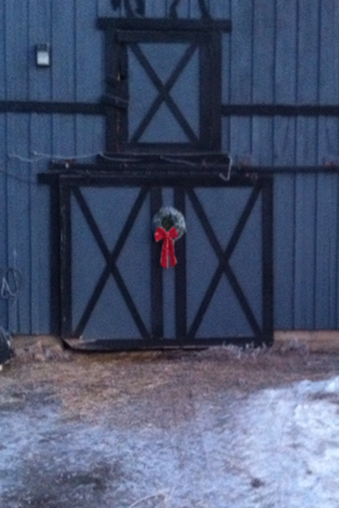 Morris and I have always included our animals in our Christmas celebrations. An extra large bone for the dog, special treats for the cats, and of course an extra ration for our beautiful horses. Since our first Christmas with horses as part of the family Morris and I have always gone for a Midnight Christmas eve ride. Well it used to be at midnight but now that we are older, we ride a little earlier, so that we can enjoy our new Christmas tradition of being asleep by 10 o’clock. It seems only right to include the animals in our Christmas celebrations, since they were a big part of the very first Christmas celebration. I have come to believe that being born in a stable was not the worst way for the Savior of the world to make His entrance, but the best way. It is in the stable that we learn the importance of time; we learn what needs doing now and what can wait. It is in the stable that we learn that there are things that we can’t do alone and that it’s okay to ask for help. And it was in the stable that I came to understand that the difference between life and death is but a breath. And that there are things that we can’t control no matter how much we would like to. I have learned that wealth is not measured by what is in the bank, but by what is in your heart and by who is in your life. I love the story that tells us, that while the rest of the world slept oblivious to blizzards and miracles; a young couple knelt in the dirty straw waiting to be part of the most climactic event of all time. And that for just that moment it didn’t matter, what was waiting for them on the other side of the barn door. On the other side of the barn door there will be storms and there will be sadness. Life will be a blessing for some and a tragedy for others. And people being what they are, there will always be wars and rumours of wars, but this is the season to pause and appreciate the miracle of life and love and family, this is the season to take time to enjoy, to take time to celebrate and to share our many blessings. It is the season to wish well our friends and neighbors as well as strangers. So from our barn to yours we wish you all the very Merriest of Christmases.  I can’t help but think that the relationship between a horse and their owner starts out a lot like a dating relationship. With the ‘starting’ of the relationship often the biggest hurdle. Maneuvering the ads on a site like Kijiji can easily be compared to finding that perfect someone on a similar human only site; because a human to Equine relationship often has all the same drama. For example a sale ad that reads like this,“This great little horse has the potential to go in any direction you want to go.” Just might be code for, “I haven’t done a thing with this horse since the day I got her-but hey anything is possible.” Not much different than a human dating site posted by, “An artistically minded man who writes poetry and loves his Mama is looking for the love of his life.”Just might be code for, “Can’t hold down a job, and still lives in his mother’s basement, but the good news is Mama doesn't mind if he has sleep overs." The buying and selling of horses is a tricky business and like the first date attention needs to be paid to detail. Sellers who offer sound horses don’t visibly gulp and begin to sweat when you want to make the sale contingent on a vet check. And buyers who are offering to give your horse a home in which they will be well cared for usually don’t need to write you three hundred, ten dollar each, postdated cheques. In dating and buying horses the same basic rules apply; if you are meeting a stranger, meet in a public place and if you are buying a horse take a seasoned horse person with you, even if you are a seasoned horse person. Honesty really is the best policy rather you are selling or buying because just like the song says there really is someone for everyone, even when that someone is a horse. An ad that reads,“Easy keeping, tall, dark, handsome been there done that kind of gelding is looking for a lady with soft hands, endless patience and unlimited financial resources,” could more honestly be worded this way,“Not so easy keeping gelding will require attendants; I will need a vet, a farrier, and a dentist. I will need to be de wormed regularly and inoculated annually. On a daily basis I will need to eat approximately 2% of my body weight in roughage just so that I can produce 8-9 tons of manure every year. Did I mention that I can easily turn, 10 to 12 gallons of water a day into 6-10 gallons of urine. And let’s not forget about tack, brushes, blankets, board, coaches, trainers and clinics.” Will almost always be answered by a person like this,“Soft hearted horse lover willing to work hard to gain your trust, willing to face inclement weather and treacherous roads just to see you. Willing to forgo any special occasion with family or friends if you should have any veterinary needs arise. (Or if the sun is shining and I would rather go for a trail ride.) I have two jobs and available credit.”
There are those of us who consider a stable smell an aphrodisiac those of us who don’t mind a saddle in the house. Those of us who would rather be cleaning the saddle than the house. Those of us who are easily identified as equine addicts. And it doesn’t matter what breed of horse we promote; or what discipline we love. It doesn’t even matter the size of the hole in our bank account, we are all the same. And we all started out the same with the same breed of horse. The invisible horse, the dream horse, the pretend horse, at least that’s what Morris and I have discovered in our close to a hundred combined years of equine addiction. (Yikes)
We have met many wonderful horse people over the years that’ve had their first riding experiences on broomsticks, fence rails, bicycles or tricycles; All the while imagining that they are flying like Tonto across the parries on a painted pony, or that they are racing for the winner’s circle at the Kentucky Derby, or that...you get the picture. The pretend horse is often our introduction into the very real world of horses; at least it was for Morris and me. And even though Morris and I have the pleasure of owning and working with real hoof beat horses we have kept our pretend equine partners. Our invisible horses are still with us as an integral part of our horse herd. We have found though, that invisible horses do need the same amount of exercising as our other horses, so we make sure that we bring them in the arena for riding lessons, spacing them in between the riders, not only do they get some conditioning but their presence in the arena helps keep the riders s a little bit safer. We follow the same practice when we are out on the trail. It doesn’t cost as much to feed an invisible horse as it does to feed the real hoof beats, but it does take the same amount of effort. When we are feeding hay we place the feed for the invisible horses in between the feed for the rest of the herd, it cuts down on horses that have a tendency to run from one pile of hay to the next and cause a disturbance. And even though invisible horses have no need for farrier or veterinary work, we bring them in the barn just the same. We tie them in between the horses that are getting worked on. Over all of our years in the horse industry we have never witnessed a hoof beat horse striking out at an invisible horse. As far as horses go you can’t beat their disposition, besides they were our very first love in our passion for horses. The very least we can do is to give them the care and consideration that they deserve. The Release; The most important cue that we can give our horse.
For years now she’s been known as the old horse; but she wasn't always. She was the first horse that I bought as a married woman. She was part of a dual horse package that my husband and I went to look at. I wanted a gelding and I was partial to a solid faced horse. She had a blaze and I knew she was mine from the moment I saw her. My husband by the way bought the solid faced gelding. Her name was Honey Bee and she was so much more than just my horse. She was my sanity and my stability as I navigated through the early years of being a wife and mother. My escape from the chaos and responsibilities of a young family my solace through the sometimes turbulent teen years and beyond, and the best date nights always included her. It was through her that I had the privilege of introducing, my children and then my grandchildren to the wonders of all that is a horse; she was ever patient as tiny fingers stroked with awe her velvet soft muzzle, and she was always willing when they pleaded for just one more ride. Honey Bee and I must have logged a million trail miles, together we climbed mountains and crossed rivers. Together we discovered the show ring. She was the horse that I went through the CANTRA and CEF programs on. And together we got older. It didn't matter what I wanted to do or learn she was always more than agreeable. Because of her good nature and willing attitude I also used her as a lesson horse. I will admit that she wasn't always perfect and that she occasionally tried to get into a gait that we liked to call, ‘Honey Bee Home Speed,’ even so she was always a dependable mount and a trustworthy teacher for even the most nervous of novices. But more than any of these things, she was my horse. How do you say good bye to horse like that, to a friend, to a partner? You don’t, you can’t, at least I couldn't. Even as she got older and older, and was no longer a ‘using horse,’ it was enough for me just to hear her soft morning knicker of hello. It was a privilege to be able to give her all of the extra care that an old horse requires, supplements, blankets and vet care. But the day came as it inevitably will for those of us who are blessed with the privilege and with the pain of owning an old horse, the day came when the supplements weren't able to keep the weight on and the blankets just weren't warm enough. So after being part of each other’s life for more than the 30 years, the day came when the Vet said, that the greatest kindness that I could show her now would be to release her from the confines of her ailing old body. I have always ridden my horses with a release cue. The release from pressure is the way we are able say to our horse, “You got it right.” The release is our way of sayings and their way of understanding, “Thank you - you have done the right thing.” The hard part is knowing when to release- if we do not release when we have that give - we can at best inadvertently teach our horse not to trust us- and at worst teach them not to obey us. From the first day of the relationship to the last, the release is the most important communication between a person and a horse. So on a beautiful October morning when the sky was blue and the sun was shining I rewarded Honey Bee with her final release cue setting her lovely spirit free. It was the last ‘thank you’ for a job well done that I was able to give her. – Good job Honey Bee, thank you and walk on. There is a story about six blind men who each touched only one part of an elephant and then tried to explain to each other what the elephant was like. The one who touched his side thought that the elephant was surely like a wall. The one who touched the elephant’s trunk was sure he was touching a snake; the one who touched only the tail thought that the elephant was like a rope. Likewise the one who touched only the ear of the elephant thought that the elephant was like a fan. And the one who touched only the leg of the elephant was sure that the elephant was like a tree. Each one was right and each one was wrong; because half truths, although they are not entirely wrong neither are they altogether true.
There are a lot of half truths in the horse world. And if you have been around horses for any amount of time you have probably heard them all; half truths that have to do with when you should bit a horse. What bit is the ONLY bit that anyone should ever put in a horse’s mouth. And then there’s the bit that no one should EVER put in a horse’s mouth. Half truths; everything from the only breed of horse worth keeping alive on the planet to the proper length of a lunge line according to whatever the latest horse guru of the day is selling. From professional horse trainers to back yard horse trainers from riding instructors to farriers to the guy at the feed store, to your neighbor whose uncle had a horse that they rode to school a way back when. We are all in a way like the six blind men who touched only a small part of the elephant and went on to try to describe the whole animal. Only instead of the elephant we are touching the horse. And only knowing the part of the horse that we have touched. While it is true that we are limited by our experiences we are not limited by what we are capable of learning and by what we are yet to experience if we are not too set in our ways to learn. We are all blessed to be a part of an exciting community of people who all though they might not share our exact philosophy concerning all that is the horse; they do share our passion and our love of the horse; and that in and of its self is worthy of respect. Remember- “Beware of the half truth. You may have gotten hold of the wrong half.” |
AuthorWrite something about yourself. No need to be fancy, just an overview. Archives
October 2015
Categories |


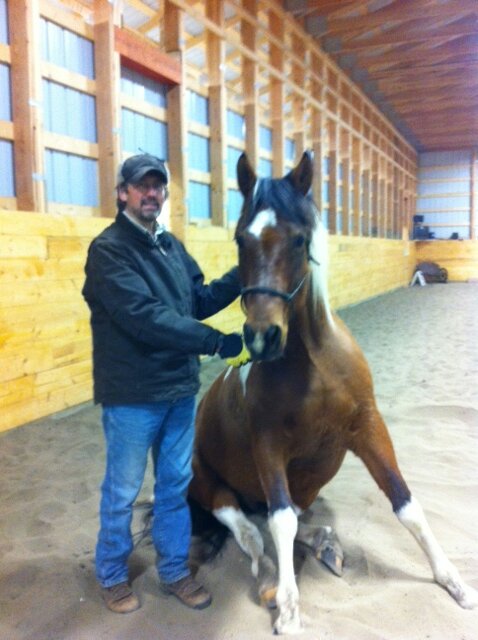
 RSS Feed
RSS Feed
